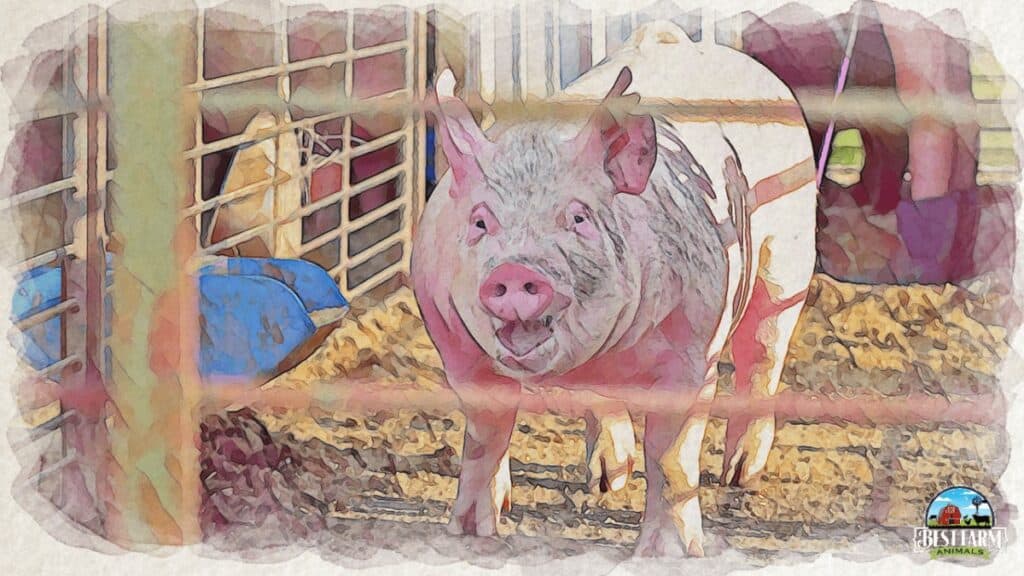Hearing a pig coughing in the morning will never be a good sound for pig farmers. Quite recently, three of my pigs started coughing, and it was astrange pig cough (almost a barking sound). On top of the pig coughing, they also had swollen red eyes and mucus running from their noses. One of my pigs seemed depressed and disinterested in food.
Over the last two years, I have dealt with several diseases and illnesses that have affected my pigs. Which is why I tend to monitor my pigs closely to ensure they’re in tip-top shape.
I ran through my handbook of pig respiratory infection and couldn’t pinpoint what was wrong. So I decided to contact our local vet and get more information on what causes the pig coughing and the best course of treatment.
Why is my pig coughing? A pig cough can be caused by several pig respiratory infections, including cold and mycoplasma pneumonia. Pigs coughing can also be a sign of swine flu, pig prolapse, Bordetella bronchiseptica, circovirus disease, reproductive and respiratory syndrome, and roundworms. Once pigs cough, they might lose their appetite, wheeze, sneeze, and show other negative effects.
It’s imperative that farm owners keep an ear out once they hear a coughing pig. Identifying which pig respiratory infection they have can make a big difference, from treatment to prevention. A pig cough isn’t something that owners should disregard. Understand more about pig respiratory diseases by reading below.
Pig Coughing Sound: What Does a Pig Cough Sound Like?
The pig coughing sound is somehow similar to a human’s cough— it’s dry and loud. It’s hard to miss the sound of coughing pigs since it’s unique, and sometimes sound like pigs choking from their mucus
Just like with humans, no pig cough is the same. Pigs will make different coughing noises based on the cause of their pig cough. The pig coughing sound also depends on the irritation or damage being done to their airways.
Let’s take a closer look at what a pigs cough sounds like, depending on their ailment:
Mycoplasma hyopneumoniae triggers a high-pitched moist cough as pigsyour pig tries to cough up mucus. After a few days, the cough turns into a dry cough that sounds similar to a smoker’s cough. This cough is often accompanied by gagging (due to mucus buildup).
The Influenza A virus causes an explosive pig cough similar to the honking of a goose. A painful tickling sensation in the back of the throat brings on this cough.
Actinobacillus pleuropneumoniae causes a sharp and moist coughing pig. Your pigs may experience a coughing fit as they try to get rid of the fluid so they can breathe more easily.
What Happens When Pigs Cough?
When pigs cough, it tells that a respiratory pathogen has entered the pig’s body. Coughing pigs is common, but not normal for pigs. It is a serious symptom of different pig respiratory infections that can eventually hurt or kill our pigs once left untreated. Anything that can trigger irritation inside a pig’s body can make it cough non-stop.
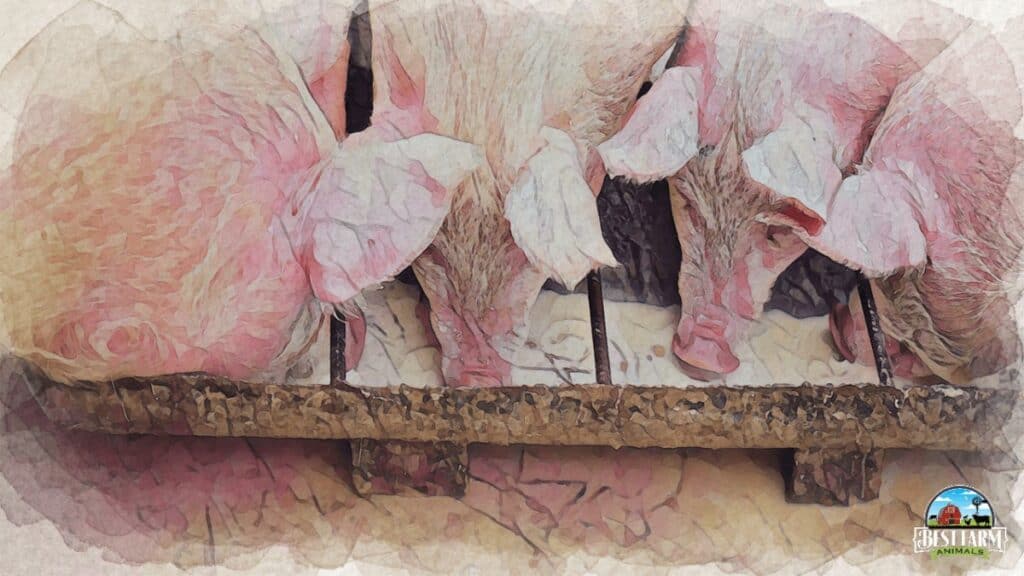
3 Causes of Pig Coughing and Steps to Take
Why is your pig coughing? Let’s take a closer look at seven common pig respiratory infections that cause a pig cough and the steps you should take to treat (and prevent) them:
1. Pigs With Mycoplasma Pneumonia Have Dry Cough And Fever
One of the most common causes of coughing pig is Mycoplasma Pneumonia which is from the pleomorphic organism Mycoplasma hyopneumoniae. This widespread pig respiratory infection causes growth retardation, a persistent dry cough, high fever, sneezing, shortness of breath, reduced growth rate, and lung lesions in pigs.
The organism makes pigs susceptible to secondary infections such as Pasteurella multocida and Actinobacillus pleuropneumoniae. It inhabits a pig’s respiratory tract and only survives in the outside environment for a short period.
Mycoplasma pneumonia in pigs spreads either through direct contact (nose-to-nose contact) or airborne particles over 5 miles. This disease affects pigs of all ages and can also be passed from a sow (female pig) to her piglets through suckling.
Poor ventilation within pig buildings can also contribute to the spread of the disease by allowing infected air to circulate throughout the building.
As a result of mycoplasma pneumonia, lung lesions can develop in pigs between three and five months old. While mature pigs can recover from this disease entirely, the bacteria can remain in the respiratory tract for up to seven months. The incubation period for this bacterial disease is two to eight weeks before symptoms show.
If you are wondering if humans can catch pig pneumonia, the answer is no. Mycoplasma pneumonia is not a zoonotic disease and poses no threat to humans. However, pneumonia can easily be spread in an enclosed area like a pig pen and affect other healthy pigs. Thus, cleaning the pig pen is a must once your pigs acquired the disease.
Unfortunately, there is no cure for Mycoplasma pneumonia, but it can be prevented. Antibiotics can also help ease the symptoms. If your pig is severely affected by the disease, you’ll need to inject them with long-acting OTC (oxytetracycline), Tiamulin, Valnemulin, Penicillin, or Streptomycin.
LA-200 for pig cough is also a good option to treat mycoplasma pneumonia. It can also be used to treat bacterial enteritis. Apart from pigs, this medicine treats similar infections with cattles.
Keeping your pig’s area clean by removing manure and maintaining proper ventilation helps reduce the risk of infection. You can also do the steps below to prevent Mycoplasma pneumonia in pigs.
Preventing Mycoplasma Pneumonia in Pigs
Ensure pigs are vaccinated regularly to help prevent lung lesions from developing.
Add Tetracyclines to the feed as a preventative measure.
Weaned pigs (16 weeks old) must be medicated with CTC (chlortetracycline) or OTC for up to eight weeks.
Keep your pigs’ living environment clean and disinfected. Good hygiene for pigs is a must
Lessen the number of pigs you have together. A crowded pigsty can cause further infections.
Use the All-in-All-Out management system.This method ensures that your piggery is properly organized while also preventing cross-contamination between sick and healthy pigs
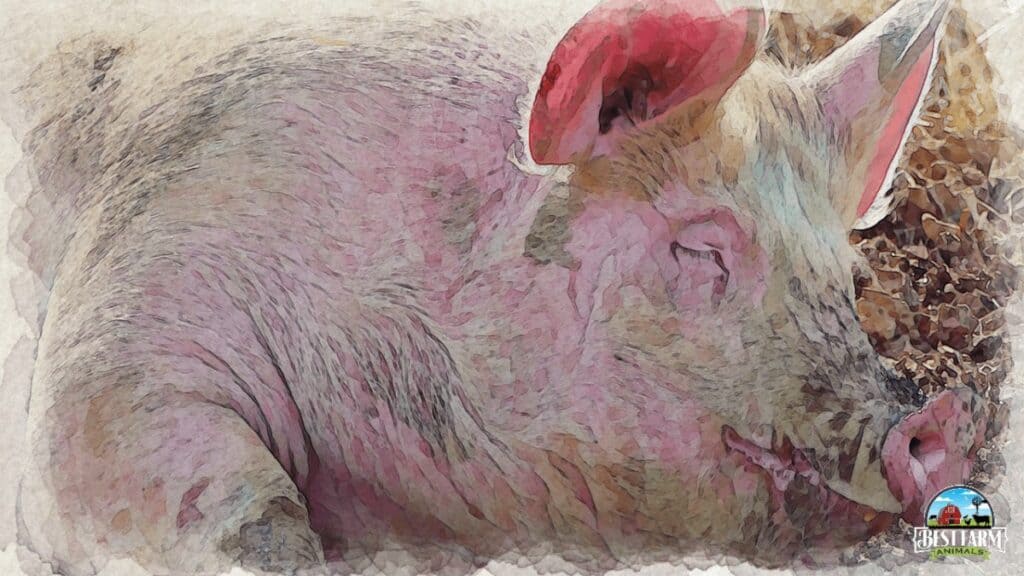
2. Bordetella Bronchiseptica Causes Pig Coughing and Sneezing
Bordetella bronchiseptica is a bacterial disease that causes pig coughing and sneezing. Other symptoms of this infection in pigs are tear staining, epistaxis (nosebleed), fever of up to 104 F, and anorexia or extreme weight loss in pigs.
The pigs’ upper and lower respiratory tracts suffer the most from this pig respiratory infection. Unlike most other porcine respiratory diseases, this bacteria has a rapid onset and presents clinical symptoms as early as two to three days after exposure. This nasty bacteria causes two major disorders in pigs, namely, Bordetella rhinitis and Bordetella bronchitis.
Pigs of any age are susceptible to bordetella organism, however, it is more commonly seen in young pigs. If their immune systems are strong, the antibodies should help fight the infection.
However, the Bordetella organism makes the pig susceptible to other respiratory-related ailments and diseases if their immune system is weakened Bordetella bronchiseptica also causes inflammation of a pig’s airways, resulting in mucus build-up and coughing fits. The disease can lead to pulmonary infection and even death (worst-case scenario).
Bordetella bronchiseptica is highly contagious and can spread quickly through your herd. Bacteria can spread through contact with an infected pig or aerosols with infected droplets sprayed through sneezing and coughing.
The organism can survive for several months inside an infected pig. It can also most likely stay in humid conditions, moist surfaces, and water-rich soil. This means the disease can also be spread through fomites (clothing, objects, and vehicles).
Essentially, poor facilities and biosecurity, overcrowding, stress and inadequate nutrition are all factors that contribute to an outbreak of BB.
Symptoms of Bordetella Bronchiseptica
Look out for these symptoms if you suspect your pig has Bordetella bronchiseptica:
- Excessive sneezing (especially in piglets)
- Excessive Coughing
- Tear staining
- Epistaxis (nosebleed)
- Fever of 104F
- Anorexia or extreme weight loss
Treating and Preventing Bordetella Bronchiseptica in Pigs
After weaning, give your pigs antibiotics in their feed, such as Trimethoprim.
Regular vaccination with formalin can prevent the disease if used over a long time.
Apply the All-In-All-Out management system.
Ensure good ventilation.
Quarantine pigs to avoid spreading the disease if any of your pigs show symptoms
Antibiotic treatment can help manage the symptoms of Bordetella Bronchiseptica in pigs. However, it’s important to note that BB is resistant to Ceftiofur and trimethoprim-sulfonamide combinations. Antibiotics such as Chlortetracycline help reduce the symptoms associated with BB, but they’re unsuccessful in clearing the respiratory tract infection.
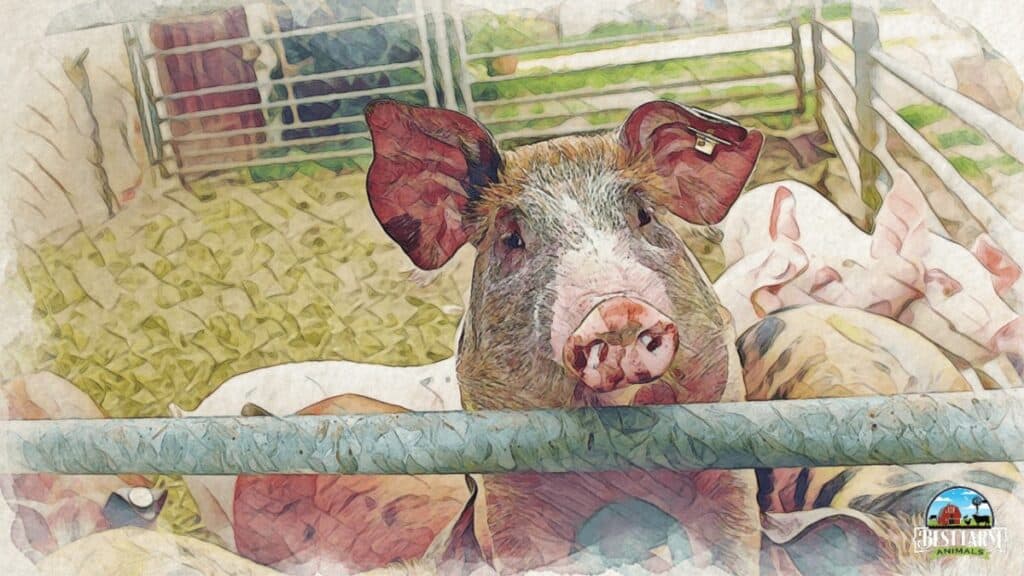
3. Lungworms or Roundworms Cause Pig Coughing and Not Eating
Another cause of pigs coughing is a parasitic disease known as lung worms, or roundworm infection (Ascaris suum). This pig respiratory infection can result in pigs coughing and not eating, diarrhea, difficulty in breathing, and obvious lethargy. They also show symptoms like sneezing and the pig’s abdomen hangs toward the ground.
Lungworm infestation occurs when a pig accidentally eats Ascarid eggs. The eggs spread through contact with infected pigs, feces, dust, and insects that carry the eggs, such as cockroaches and flies.
The biggest spreader of these parasites is contaminated feces in pigs’ living environment. The Ascarid eggs hatch in pigs’ intestines and pass through the bloodstream. The larvae will attach themselves to the liver and should reach the lungs within ten days of ingesting the eggs.
The pig then coughs up the larvae and re-swallows the parasite. The cycle will continue until your pig has a severe roundworm infestation.
This parasite can survive in your pig’s body for six months; some have survived as long as a year. Commonly, pigs with roundworm makes its home in the small intestine and causes damage to the liver and the lungs. If your pig is severely infested with roundworms, it can cause lung damage, leading to death if left untreated.
Make sure to wash your hands carefully after dealing with a roundworm-infected pig. This parasite is zoonotic (can be passed to humans) and can be spread through accidental ingestion of contaminated sand.
Did you know: An adult roundworm can lay up to 2 million eggs daily.
Causes of Roundworm
Roundworm infestation occurs when a pig accidentally eats Ascarid eggs. The eggs spread through contact with infected pigs, feces, dust, and insects that carry the eggs, such as cockroaches and flies.
The biggest spreader of these parasites is contaminated feces in pigs’ living environment. The Ascarid eggs hatch in pigs’ intestines and pass through the bloodstream. The larvae will attach themselves to the liver and should reach the lungs within ten days of ingesting the eggs.
The pig then coughs up the larvae and re-swallows the parasite. The cycle will continue until your pig has a severe roundworm infestation.
Symptoms of Roundworm
Your pig will display the following symptoms if they have a roundworm infestation:
- Coughing
- Sneezing
- Obvious lethargy
- The abdomen hangs toward the ground
- Doesn’t put on weight
- Difficulty breathing
- Diarrhea
Treating and Preventing Lungworm in Pigs
Ideally, you should watch out for pneumonia when your pig has a lungworm infestation. There are no antibiotics to treat pneumonia, which can lead to severe lung damage and death. Ivermectin (Ivomec) and Benzimidazoles are also effective treatments that paralyze and kill roundworm parasite.
Deworm your herd regularly to prevent the spread or possibility of pigs having roundworms
Add Hygromycin to their feed. It is a anthelmintic additive that is usually added to the pig feed to prevent diseases like roundworms.
Keep your pig’s living environment clean. Ensuring the pig pen is cleaned all the time is a major help for pigs not to have roundworms.
Steam-clean the pig pen, as the Ascarid eggs are resistant to disinfectants.
Common Pig Respiratory Infections That Cause Pig Cough
- Mycoplasma pneumonia
- Bordetella bronchiseptica
- Porcine Circovirus Disease
- Porcine reproductive and respiratory syndrome
- Swine influenza
- Aujeszky’s disease
- Lungworms
Steps to Take if Your Pig Has Respiratory Issues:
If your pig struggles with respiratory functions, check that nothing has changed. Some respiratory issues may arise from a dust storm, a dirty and dusty pen, or abnormally high dust levels and pollen in the air. You may also see respiratory illnesses spike during wet/cold seasons or during the spring when the weather vacillates from cold to hot quickly.
Make sure the pigsty is clean, as dust can further irritate your pig. I like to spray the pigsty with some warm water with a safe disinfectant like hydrogen peroxide or ammonia once a day to reduce dust and kill off bacteria. Chlorine-based antiseptics are also safe and great for removing droppings, pig slurry, and dust when washing the sty. Remember to move the pigs for a few hours while the fumes dissipate.
You can also feed your pig a warm broth. Check your local regulations if it’s an animal-based or bone broth (as opposed to a vegetable broth).
If you suspect a respiratory illness in your pig, take it to the vet quickly. It will need antibiotics.
- Antibiotics will need to be administered by your vet.
- Make sure the pigsty is clean.
- Give your pig warm broth.
- Encourage your pig to move around for little bits at times.
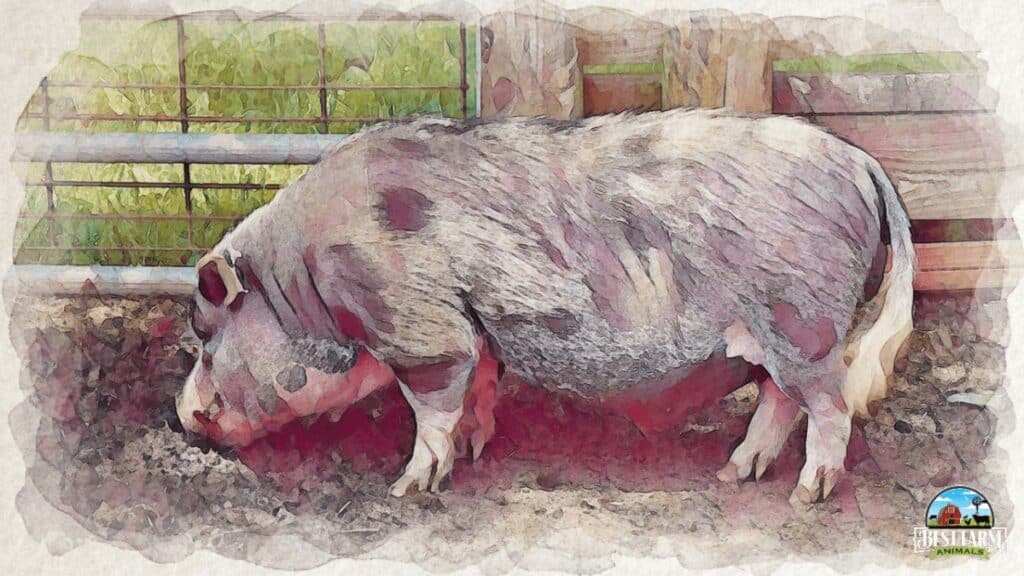
Pig Coughing FAQs
Once you hear pigs coughing, it’s only a matter of time before the entire herd can be infected with a disease. There are several pig respiratory infections that can cause a pig cough, and they have different ways to be treated depending on which disease the pigs acquired.
Why Are My Piglets Coughing?
Like older pigs, piglets cough once they have acquired different pig respiratory infections such as pneumonia and swine. The causes behind piglets coughing are also similar with the rest of the herd. They can get the disease once the pen is dirty, there’s an infected pig in a herd, or the sow was infected while pregnant.
How Long Does Pig Pneumonia Last?
Symptoms caused by pig pneumonia can last up to four weeks in pigs. However, the dry, persistent cough can sometimes linger for up to 2 months. Pneumonia or pasteurellosis is an infectious disease and can be caused by viral infections or parasites. However, with proper diagnosis and treatment, their recovery time can be lessened..
Is Pig Pneumonia Contagious?
Pig pneumonia is highly contagious and can be transmitted from pig to pig through direct contact and through aerosol contact. The disease can also spread through contaminated water, food, clothing, and equipment. Bacterial pneumonia is usually contagious 48 hours after being treated while viral pneumonia is infectious while the pig shows symptoms.
Is Pig Respiratory Infection Contagious?
Pig respiratory infection is contagious and quickly spreads between pigs. This respiratory tract infection spreads through aerosols and nose-to-nose contact between infected pigs.This illness is also called Ezootic pneumonia and you should beware of this disease since it pigs can catch it any time of the year.
Conclusion
Thankfully my vet diagnosed the reason behind my pig coughing and I was able to find out the cause of its unusual pig cough. Our pigs had developed swine influenza when I was sick with the flu, I unintentionally passed the flu virus on to my pigs by moving in and out of their living area.
The vet provided us with correct treatment and strongly advised me to stay away from the pigs when I felt fluish. She also mentioned that I treat all of my pigs for the flu, as some of the flu viruses don’t display any symptoms, but the pigs may still spread the disease.
With all of these learnings at hand,I treated all my pigs accordingly and planned to give them booster vaccine against influenza to prevent further spread.
If you notice similar flu-like symptoms or coughing pigs, it’s essential to respond swiftly to the symptoms so as to prevent further spread. Regularly and timely booster shots are also important to keep your pigs healthy and protected from common pig cough diseases.
My Most Used Pig Supplies
This list contains affiliate products. Affiliate products do not cost more but helps to support BestFarmAnimals and our goal to provide farm animal owners with accurate and helpful information.
Purina Pig Chow will last well (or Mazuri is popular, but I haven’t tried it), and the stainless steel non-skid bowls that will help keep the mess down.
A pig blanket to keep her warm. This one also has bright colors and helps to provide rooting without the destruction.
Pig Harness for walking and handling your pig. There are a lot to choose from, but this one is pretty easy to use. If you want one that has a separate leash, this looks like a good one.
A large crate for keeping her safe in your house at night and when you leave the house. This is essential. You’ll also want a litterbox, and I like mine with a lid for nighttime. Pine shavings are best, and you may be able to find them in larger quantities locally.
When you have accidents, Odoban will help eliminate odors. When you are potty training, these floor pads work great for keeping your house clean while training her to go in certain places.
You’ll also want an outdoor house to keep her warm when she gets outside time, an essential part of her development.
Dewormer- Ivermectin is the primary dewormer I use, although I do rotate with a non-ivermect ingredient once so that the worms don’t get immune to it.
Resources:
Research Gate:
Growth Retardation in Pigs Study
Research Gate Study
Research Porcine circovirus diseases

